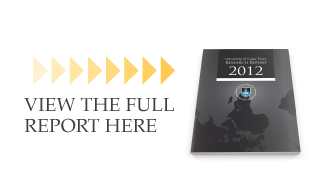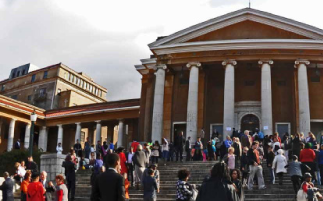 |
||
|
It is gratifying to report that UCT researchers have delivered a truly outstanding performance in 2012, and the university is fortunate to have been able to gather together so many dedicated people who work so hard to roll back the frontiers of knowledge, to keep the university at the cutting edge in so many fields, and to better society in our own country and beyond our borders. It is against this backdrop that I have pleasure in reporting on progress in the past year. |
 |
|
The Faculty of Health Sciences became the first faculty from Africa to be listed in the top 50 of the Times Higher Education World University Rankings of Clinical, Pre-clinical, and Health Universities, an achievement that coincided auspiciously with the Faculty of Health Sciences’ centenary celebrations. Similarly, the Law Faculty was ranked in the top 100 of the Quacquarelli Symonds (QS) World University Rankings, the only African law school to have achieved this; and the Graduate School of Business was ranked by the QS Global 200 Business Schools Report as the top emerging global business school with the most appeal and recognition among international employers. Our performance in the ranking systems remains a measure of consistently high international standing and reputation, relative to the thousands of other universities around the world who are ranked by these systems.
Contributing to our performance in the ranking systems is our high number of publications in international journals (close to 90% of our journal production), which influences our international visibility and impact. These figures also feed into the national publication count system, as recognised by the Department of Higher Education and Training (DHET), and I am pleased to report that UCT achieved the second-highest national publication count in 2012, a total of 1 314.40 units for research publications produced in 2011 (each year’s figures are always for the performance of the previous year). The national publication count gives recognition to the production of books and conference proceedings, which also increased during the past year. In addition to this, we acknowledge the importance of the creative and performing arts as vital contributors to research and knowledge production, and their impact on society as a whole.
We continue to use the National Research Foundation’s (NRF) evaluation and rating system as a measure of benchmarking our research performance within South Africa. In the 2012 cycle UCT submitted the highest number of applications in the history of the NRF (118), resulting in the number of NRF-rated researchers at UCT, totalling 415. During this cycle, new A ratings were awarded to professors Don Ross and Harold Kincaid (the first ever in any commerce faculty in South Africa), Jack van Honk (Psychiatry and Mental Health) and Heribert Weigert (Physics), confirming their status as world leaders in their respective research fields. The A ratings of professors Igor Barashenkov, Doug Butterworth (both Mathematics and Applied Mathematics), John de Gruchy (Religious Studies), Gerd Gäde (Zoology), Lionel Opie (Medicine), Clifford Shearing (Criminal Justice), and Dan Stein (Psychiatry and Mental Health), and Distinguished Professor Philippe-Joseph Salazar (Rhetoric Studies), were reconfirmed under this cycle. The NRF awarded P ratings, made to exceptional young researchers, to Dr Åke Fagereng (Geological Sciences) and Dr Andrew Hamilton (Physics).
The achievements of some of our other distinguished researchers were also recognised through a number of national awards. At the 2012 annual NRF awards function, Professor Tim Noakes (Human Biology) received the Lifetime Achiever award, Professor Kelly Chibale (Chemistry) was recognised as the Champion of Research Capacity Development at Higher Education Institutions, and Professor Anusuya Chinsamy-Turan (Zoology) received the Transformation of the Science Cohort award. Professor Alison Lewis (Chemical Engineering) was named Distinguished Woman Scientist in Physical and Engineering Sciences by the Department of Science and Technology (DST), while Dr Sindiso Mnisi-Weeks (Private Law) received the DST’s Emerging Researcher Award for the Development of Rural Women. Our research and innovation achievements were evident in the 2012/13 National Science and Technology Forum – BHP Billiton Awards, where honours went to Emeritus Professor Robert Millar (Medical Biochemistry), Professor Graeme Cumming (Zoology), and the Adaptive Real-Time Internet Streaming Technology (ARTIST) Collaborative Project between UCT, East Coast Access, and the Council for Scientific and Industrial Research.
Four new Research Chairs were awarded to UCT under the DST/NRF SARChI programme in 2012: Stable Isotopes in Archaeology and Palaeoenvironmental Studies, Environmental and Social Dimensions of the Bio-Economy, Reaction Engineering, and Industrial Computational Fluid Dynamics. There are now 33 such Chairs hosted by UCT.
Across-the-board support to researchers is essential if we are to maintain this track record and grow the next generation of scholars. Such support at UCT takes the form of a range of initiatives and formal programmes to enable academics to complete higher degrees, get published, access research funding, and generally develop a passion for research. The oldest of these programmes, the Emerging Researcher Programme (ERP), reached its tenth year in 2012. To date, the ERP has provided researchrelated support to more than 600 emerging researchers at UCT, across all disciplines.
As a university, we have set ourselves the strategic goal of moving from a research-led university to a researchintensive university. This will require careful planning and the will to succeed, in order to overcome a number of challenges in moving towards our goal.
The most important of such challenges facing UCT (and, in fact, all higher education institutions) is to secure the right amount of funding to realise our ambitions in the research arena. While we remain grateful for the funding for research from our main South African funding agency, the NRF, the reality is that such funding – for research generally, but especially for the experimental sciences – is under great pressure. Because so much of NRF funding is tied for specially directed purposes (such as funding for rated researchers, SARChI Chairs, and Centres of Excellence), calls for the funding of actual research projects have been inadequate and irregular, and UCT’s research output is already being harmed – despite the fact that the university has done its best to shore up these researchers over the last few years. Secondly, the DHET’s direct spending on research in universities is only 9.1% of the total budget devoted to higher education and this is not favourable to research-led universities. Thirdly, the ongoing economic crisis in the world has had a detrimental effect on the funding of research by industry and philanthropic funders. For UCT’s research to retain its current level of impact and influence (and of course we do not want to remain static but improve), we will need to right-size the funding for our research effort.
Growing our postgraduate numbers and placing UCT as an international destination of choice for higher-degree students requires sufficient and appropriately skilled supervisory capacity. The recently established office of the Director of Postgraduate Studies intends to provide concentrated leadership at a senior level to prioritise the development of every aspect of postgraduate study and the postdoctoral sphere, and to ensure the best possible experience for the maximum number of students at this level. I am pleased to announce the recent appointment of Dr Nelleke Bak to this position.
Research that uses human participants or animals is required to undergo an ethics review. I thank UCT’s research ethics and animal ethics committees, overseen by two Senatelevel committees, for their commitment, diligence, and excellent work. The work of these committees contributes significantly to the high ethical quality of research that emanates from UCT. In this regard, we also look forward to the appointment of a manager of the recently established Office of Research Integrity.
In 2012, we celebrated 125 years of women in research at UCT and the pages that follow later in this report draw attention to this achievement. In a continuation of the research themes profiled in our 2011 research report, we showcase the outstanding research being conducted across the university, which is increasingly taking on a multi- and interdisciplinary approach to finding solutions for problems facing our continent and the world.
In 2012, Dr Marilet Sienaert was appointed as Executive Director, Research. The leadership role played by the Research Office in supporting and enhancing the research enterprise at UCT was recognised in the change in status of the department’s Director to that of Executive Director.
I am especially grateful to our donors and sponsors who generously contribute to our research endeavour, to our research partners who choose to collaborate with UCT, and to the committees, individuals, and departments across the university who contribute to raising the profile of research at the university.














